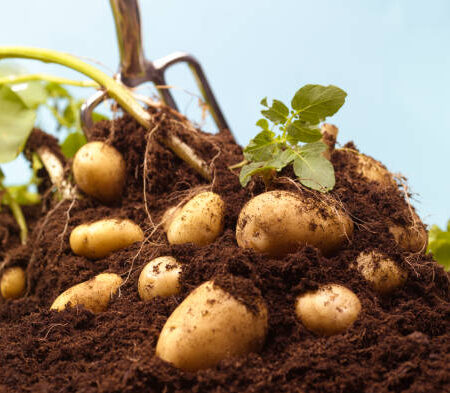Global Warming Put Potato Crops in Danger.
The effects of climate change are threatening the future of many essential crops, including potatoes, which are a key part of traditional Christmas meals. As temperatures rise, scientists are working to develop heat-resistant potatoes to safeguard these vital crops.
Development of Heat-Resistant Potatoes
A research team conducted field trials at a single location in Illinois, USA, and found that potatoes adapted to heat stress produced up to 30% more yield compared to standard varieties. This was achieved by introducing two genes to modify a process known as photorespiration, which enhanced efficiency and allowed more energy for growth. The team believes this approach could be a significant step toward improving crop yields in a warming world.
The research, published in Global Change Biology, highlighted the potential for increased yields despite rising temperatures. However, the authors stressed that more extensive multi-location field trials are necessary to confirm these findings across various environments.
Collaborative Effort in Research
The project was led by Dr. Katherine Meacham-Hensold from the University of Illinois (UIUC) and the University of Essex, working under the Realising Increased Photosynthetic Efficiency (Ripe) project. Dr. Meacham-Hensold explained that the goal was to address the need for food security in the face of global warming.

She emphasized the importance of developing crops that can endure more frequent and intense heatwaves to meet the growing global food demand, especially in regions vulnerable to reduced crop yields due to climate change. She noted that the 30% increase in potato tuber mass in their trials demonstrates the potential for improving photosynthesis and producing climate-resilient crops.
Broader Impact Beyond Christmas
Dr. Amanda Cavanagh from the University of Essex remarked that climate change poses a significant threat to major food crops. She stated that the research confirmed that strategies to enhance heat tolerance could be applied from model plants to food crops. In the context of Christmas, she noted that for many, roast potatoes are a cherished part of the festive meal, and this research plays a crucial role in ensuring their availability for future generations. Beyond the holiday season, she highlighted the potential impact this work could have in developing countries, where climate change is already endangering food security.
Preserving Food Quality
Professor Don Ort, a plant biology and crop sciences expert at UIUC, added that an essential aspect of this study was ensuring that genetic modifications to enhance photosynthesis did not negatively affect the nutritional quality of the potatoes.
He stressed that food security is not only about producing more food but also about maintaining the quality of what is grown, ensuring that crops are both abundant and nutritious.
ALSO READ: Tourism CS Seeks Support for Wildlife Census
Conclusion
In conclusion, the ongoing research into heat-tolerant potatoes shows promise in the fight against climate change, potentially safeguarding food supplies for future generations.
As scientists continue to explore ways to enhance crop resilience, the impact of their work could reach far beyond holiday meals, providing a crucial tool in addressing global food security challenges.



Comments